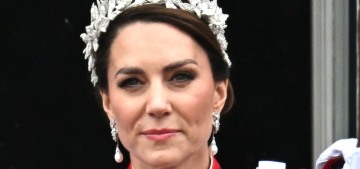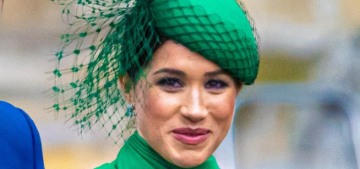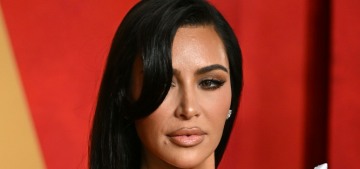I’m fascinated by the evolution of language and how we speak and write about some tricky issues involving the LGBTQ community, race and feminism. The way we spoke about transgender people just four or five years ago is now considered offensive. The way we speak around feminism changes every year. And speaking about race is a minefield. I’ve heard people say that they don’t care for the term “people of color” of “woman of color” before, and I never really understood the beef with that terminology. We just talked about that again with that Amy Robach kerfuffle a few weeks back, when she said “colored people” instead of “people of color.” Well, in a new interview, Priyanka Chopra – an Indian woman, a woman of color – says that she doesn’t care for the term either. Here are some highlights from Priyanka’s new piece with Refinery29:
Feminism as an Indian woman: “For eons, women have been told how to be or think or dress. I come from a part of the world where this debate is so heated, especially because we’re a country that has goddesses. We pray to women. But at the same time, we prey on them…Feminism needs men to understand that we don’t want to berate you or kill you or hate you. We just need you to stand by us.”
On beauty: “Beauty has nothing to do with me. I was born with it. But I don’t want to be known by the fact that I’m beautiful. I want to be known for the fact that I’m an achiever. Not even an actor. I don’t want a label. I don’t want a box. I want a legacy.”
Girl-on-girl putdowns: “Women pull each other down all the time. That’s our weakness. The boys come together — like bromance. Why can’t girls do it, too?”
Woman of color: “I know everything is about diversity right now. But I think it should be about humanity. It’s 2016. It’s so easy to separate ourselves and become smaller and smaller pieces of humanity. I don’t like the phrase ‘woman of color.’ I feel like that puts women in a box. I’m a woman, whether I’m white, Black, brown, green, blue, or pink — whatever. I think we need to start looking beyond that. It would be a big win for women, period.”
Her relationship with the paparazzi: “If I walk out on the streets and there are paparazzi taking my picture, I’m not hypocritical enough to turn around and say, ‘Don’t take my picture.’ It’s their job to do it. I feel like 90% of my life is an open book. I don’t even save any pictures. Any time I need to show a reference of myself, I google it. Anything about me is on Google.”
I get that Priyanka is going on-brand on this, that she was given an American network TV show straight out of Bollywood, and her experience with race and Hollywood (not to mention race and America) is completely different than, say, Mindy Kaling’s experience or Viola Davis’s or Constance Wu’s. But to me, Priyanka’s perspective sounds so privileged, and like an argument that white people make to excuse their discriminatory/racist/shady hiring practices, casting choices and more. “Aren’t we all just one race, the human race” is the last cry of the white racist trying to justify his or her discriminatory acts, to me at least. It’s a way of shutting down a legitimate conversation about race. It pains me that Priyanka doesn’t understand that, and that her words will be used to defend non-diverse casting.
Photos courtesy of WENN.
















I don’t know anything about her background, but if it is what I think it is, she has benefitted from both a privileged background in India both regarding class as well as colorism.
She is very rich by Indian standards. She is Punjabi, who are known to be very fair and has said in previous interviews how her own extended family mad her feel bad for the colour of her skin . She is also one of the very few dusky women in the industry when most Bollywood actresses are fair. So I dont think she has benefited from colourism.
wow, i’m surprised that she is considered dusky, I would of thought fair. I’m indian origin and from the south where i think we are even more obsessed about skin colour than the north indians i konw (married to a punjabi).
The real problem is wealth privilage.
I agree. When people talk about color or gender, I think that economic status has to be considered. I think it is very different for a person of color or a trans person who is poor versus one who is rich. Money creates more options regardless of a person’s race or gender IMO.
She used to bleach her skin.
I doubt she was born with that nose, too.
Are we not all hypocrites judging her because she wants to be known as a woman, Indian n not poc. Who are we to call her out and presume her background? Are we not doing the same thing poc who like that term have been fighting for. I’m half I’m native american n Irish, I dislike the term native American, we are indigenous people, plain ansd simple. My husbands family are from Canada n we visit often. They consider Indians iindigenous people,that’s where I picked it up. In Montreal, if anyone has the chance to visit, is full of ethnic diversity. My first time I was in awe, it has such a European flavor, my in laws look at us and feels sorry for Americans. As my mom in law said, she’s a elementary french teacher, they don’t have racial problems the way we do. Then again, Canada was the underground railway to save slaves. Too bad they did not do it to their indigenous people. Sorry off topic, but don’t see an issue of someone not wanting to be called poc. I have friends who are white but don’t consider themselves white, they say European, especially the northern Greeks who are dark skinned.
I have never ever heard of any Greeks who don’t consider themselves white. Medditerranean people are generally a bit darker than Northern or Western Europeans, but that doesn’t make them not white.
@ Locke, I live in Canada and I have some friends who are older, and from different global backgrounds. The women from Persia, Eastern Europe and South America who look ‘white’ to me, don’t consider themselves white.
I have another friend who is of Indian descent, but considers herself black. She doesn’t like brown as a term, doesn’t like WOC, and is not African Canadian descent.
My Caribbean friend doesn’t identify as black or as white, she’s Caribbean.
It really seems to be generational too, and it makes sense when you consider people have been discriminatory to Italians, Greek, Polish, German, Italian, tons of other cultures in different decades.
And her beauty.Most people don’t look like her.
In Bollywood I think a fair amount of people match up to her looks-wise. Hollywood is more about being thin and fit and charismatic (i.e Jennifer Lawrence) while Bollywood seems to be more about being as beautiful as it is possible to be in an almost unreal and super glamorous kind of way (i.e Aishwarya Rai). The look she has just isn’t as common in the US, but I think it may be in India in certain geographical regions.
If you strip away the make-up, a lot of Indian girls do kind of match up to her too, imo.
+1 Perplexed.
As a white person, no opinion on what she wants to call herself. She is really gorgeous though.
That was my exact thought too, Kitten. She can define herself however she wants and it’s her right to do so.
She’s gorgeous, that’s all I got.
Same. It is not my place to say what she should or should not identify as. However, I think you could compare it to many women artists saying they don’t want to be the “female author” or “female actor” they just want to be judged in the same category as the men. In a similar way, she just wants to be talked about as a woman, not a woman of color. Just like white women who are actors aren’t often identified as “white actors” just “actors”.
I’m Indian, I enjoy Priyanka, but I don’t understand why she’s EVERYWHERE right now???? Quantico was a crappy show and the ratings fizzled, and as far as I know the only movie she has coming out is that dumb Baywatch thing. Not to mention she’s an awful actress in English (I think she’s been terrific in some Bollywood movies, but in quantico, atrocious)
I’m just so….???
I think she got a little bit of a press bump because she is going to be in the new bay watch movie with the Rock.
omg, I was so excited to see an indian woman on a major show but yes, she is an awful actress.
“Women pull each other down all the time. That’s our weakness. The boys come together — like bromance. Why can’t girls do it, too?”
I hate hate hate this. Female friendship is one of the most beautiful and organic relationships out there. Some girls bring other girls down same as some boys bring other boys down but that does not invalidate entirety of female friendships.
People who do the blue pink green thing is so sideworthy to me.
Her interviews have changed so so much since Quantico. I used to stan the hell out of this girl and her aggressive interviews during the Fashion days but I dont know why she now thinks she is God’s gift to the world.
You make an excellent point here. Agree so much with your description of female friendships and I’m someone who has a lot of male friends–but they are no replacement for the women in my life, who have been there for me through all of it.
CornyBlue, from what I remember, I think you are Indian as well.
I do value my female friendships but I have also noticed that one of the ways sexism manifests itself in the Indian community is female competitiveness to a degree that i have not experienced in my friendships with western women or women raised in the west. ( not to say that there isn’t sexism in the west) Of course this is a generalization based on my experience. What I found striking about the competitiveness was that it is not subtle at all and usually is around things that are considered in the feminine realm- like beauty, cooking and parenting. I currently live in a predominantly Indian enclave in the US and the way that some of these women have treated me is really beyond anything I have experienced. Although I do remember on my trips to India during my teens and early twenties I got a lot of rude comments from other young women, just blatant and direct about my looks. I remember walking past a group of young women, friends of my family and they yelled out Oh Miss America and started laughing at me- pretty sure it wasn’t a compliment.
I guess what I’m getting at is that sexism is alive and well in Indian culture and one of the ways it manifests itself is how women turn on each other to gain male approval. And don’t even get me started on the mother-in-law dynamic which again is another way we compete for men’s approval as they are thought to be the grand prize.
PS- I also thing there is another dynamic at play between south asian women who grew up in the west and women from South Asia proper that feed into our interactions with each other.
I’m South Asian too, and spent much of my childhood in Pakistan. I think you’re pretty dead on about everything you say, even with the desi community in America.
Hey Lyka, I’ve been meaning to tell you, I love your posts, especially the election ones.
@sanders: gosh, thanks! You always post such thoughtful stuff, and even though I don’t always comment, I love everything you write as well. Gave you a little shout out below too.
Didn’t know you are a fellow diasporic desi! Thanks for the compliment.
I was born and brought up in India so my experiences differ very much from yours. But on my side the kind of friends I had from childhood are something I have never found anywhere else. I do agree that Indian woman are very competitive in terms of cooking and beauty and such and often make their own family feel horrible about the colour of their skin or how they look and such but I dont think that is exclusively something Indian. Also I dont think my generation has much of it compared to say my mothers generation from what i remeber so hopefully moving in the right direction.
Going into techno colour descriptions of human beings is a strong indication of someone with a weak analysis of racism.
“Bromance” is just a trendy term. Men are rarely as close with each other as women are.
I worked with a man from India who told me he classified himself as ” White”, the man was browner/blacker than I. It was common knowledge at my job that a lot of Indians identified as “white”. Just wondering if she believes she should be classified as “white”. I’m NOT JUDGING, maybe IN INDIA she is identified as white. Now, in in this country, USA she is looked on as a person of color, just saying.
Lmfao what? I’m Indian and have literally never heard that before. I’m fairly certain you’re making this up.
No, I’m not. I swear! I never forget what he said because I was taken aback. On my word, I’m not lying.
I believe you. Iirc some South Asian populations are categorized as Caucasian. It has to do with bone structure or whatever archaic methods the scientists used back then. Your friend may have been conflating White which is a social contruct with Caucasian which is more about anatomy.
I am Russian, we classify Indians as white.
I don’t know if it is outdated but in Russia we are taught there are 3 races – White, Black and Mongoloid.
Everyone who is not Black or Mongoloid is White. Indians, Arabs, Berbers, Latin Americans of European descent are white.
Colonialism can do really messed-up things to the collective psyche (it’s the exact same thing in my birth country, the entire entertainment industry here capitalises on internalised racism along with classism—to the point of auditions getting really uncomfortable).
Indians don’t consider themselves white. Indian and European languages have a common base and a lot of history. However, we don’t consider ourselves people of color-we consider ourselves Indian. We have a rich history going back thousands of years. Why give up our identity and box all Indians into one group-you can find white, black, brown, tan.all shades of color in India.
Literally never heard of this before. There is no white people in India of Indian origin atleast
I have friends from Puerto Rico, Cuba and Dominican Republic who identify themselves as “white” but would not be considered white here and identified as a person of color.
This issue with Hispanics/Latinos is much different since there are white Latinos and black Latinos etc etc. That’s an entirely different subject. The matter here is an Indian who says he’s white, which is not a thing. No Indians consider themselves white.
I’v meet some guys from Dominic Republic who told me their fathers were BLACK and they were pretty dark skinned BUT they said and i quote “At least I am white like my mother”. All of them. And they were so racist towards the African guys we had there I had to ask why. Not gonna write all here but they hated them even though they were 50% black. So sometimes I think identifying with a specific race has to do with the social status. She is Indian, has some coloring but she comes from a high social cast, rich family so she has to be called white as the ones with color are poor and not high class. But in america she is considered WOC and in her mind it’s a put down so she doesn’t like it. I may be wrong.
It’s tough though, because in the US, if I’m not mistaken (or maybe to be clearer I should say “from my experience”), colour seems to be based on, among other things, place of birth.
I am extremely fair, of European descent. But I was born and raised in Argentina, so I was always referred to as Hispanic or Latina in the US. Me? I see myself as white.
Antonio Banderas said it best “I only found out I wasn’t white when I went to the US”.
Isn’t Antonio Banderas from Spain? Why would he not be considered white? Is it because of his name? A genuine question…
@perplexed. I worked in the US on board of cruise ships when I was in my early 20s. Part of my job as a purser was to work with immigration when passengers checked in. In many occasions I heard them refer to both Spanish and Italians as Hispanics/Latinos.
I assume he must have had a similar experience.
Banderas would be considered Hispanic in the US, which is its own category, separate from White.
I work with CDC grants and our state department of health. I can tell you both government agencies view it like this: Black, White, Asian, American Indian/Alaska Native, “Other”. Under each section is a looonnnngggg list of countries to be more specific (i.e., Sub-Saharan African, Congolese, Caribbean under “Black”, anything European including Spain and Portugal is “White”, Indian is broken down further under the “Asian” category). When we are compiling demographic information for race we need to check one of these boxes. We also need to check the ethnicity box, either “Hispanic” or “non-Hispanic”. If one is from Puerto Rico, Cuba, South America, Dominican, etc. that must also be specified. But according to these government agencies, one is coded as “white” even if they are Hispanic, as being Hispanic is not considered a racial group – it’s an ethnicity. As much as I hate asking people to classify themselves (and the “other” box gives some buffer, but also allows for skewed data – we have a ton of Jewish clients who refuse to identify as White despite the fact being Jewish is an ethnicity) for grant purposes I get the need for it. For example, if someone states they are multiracial and one of those races is Native, I’ll assess for how salient their culture is. If they strongly identify as Native I’ll sometimes ask if they are comfortable having me check “native” to make a broader case for increasing clients in underserved demographics. It’s a dirty game, but it’s also how we identify pockets of need as much as I hate to admit it.
I dont know why this is so surprising or weird to anyone.
American racial classifications have always been fluid depending on the political climate and birth rate of anglo whites.
Italians, irish, Jews were not white in america until very recently.
And the reason anglo whites lump all Italians and spanish people together with Mexicans and other Latinos is because of phenotype. They see the slight tan, dark hair and eyes and categorize you as a generic made up category called hispanic. Its as simple as that but something not many spaniards for example want to acknowledge because there is a disturbing hierarchy among certain groups.
I live in a country where most people are white and have blond hair and blue eyes and you bet Antonio banderas would not be white here but so what? Why does it matter? Race is a social construct unlike say ethnicity which should hold more importance anyway because it says more about you.
The kind of classification I learned at school put Europe, the entire Middle East amd parts of Africa under “white”. Not India though. But maybe in India they classify race differently. Racial grous in the US are not the same as in the rest of the world either.
Uhhh I’m Indian and have never heard of any Indian classify themselves as White lol. We are Asian.
I think that indians are a mix of so many different ethnics groups. It’s such an old civilization with multiple groups coming in from all over through trade or invasion. There are indigenous communities too. That is why we have such a variation in skin tone, even within one family.
Actually no. Like 99% of Indians (in India, people in the Indian diaspora around the world have a higher chance of being mixed) are genetically either Aryans (northern) or Dravidians (southern). There’s very little mixing with other ethnicities except between north and south.
Carebare
I think the idea of some kind of pure category like Aryan and Dravidian is suspect. These communities came into contact 4-5 thousand years ago. Then, there was further influx of Persians, Arabs and Turks. How do you account for the Asian features you find in Indian states that border Nepal and Tibet? I highly doubt any kind of genetic testing would label one as Dravidian or Aryan. Those terms make sense when talking about migration and settlement history of South Asia and maybe language groups but not so sure about ethnicity.
My community traces its roots to the middle east but we look nothing like someone from that region. We have been in India for over 1500 years and intermarried with the local people in South India ( i guess what you’d consider to be Dravidians) We will not be mistaken for a middle easterner as we look Indian, encompassing varying shades of brown.
I said Asian because India is a part of Asia…so therefore we are classified as “Asian”. South Asian to be exact. I have been to India many times. I know all about the Aryan blood discussion as I know about the invasion of the Portugese and Brits. Of course when someone invades your country you are going to have mixtures. But all in all, us Indians call ourselves South Asians…but never Caucasian.
@me – exactly, any Indian in India calling themselves ‘white’ would be laughed out of the country, no matter how fair their skin was. Heck, I’d be one of the Indians laughing along – we don’t entertain delusion on that scale!
@Carebare – as @sanders pointed out, the whole Aryan/Dravidian distinction as some kind of genetic dividing line, is bs – and if “99%” of Indians are either genetically Aryan or Dravidian and there’s very little mixing between ethnicities, then what does that make the North-East? Pretty sure people from there make up more than 1% of our population….
I (as an Australian in my late 30’s) assume white means Caucasian (vs Mongoloid or Negroid) because that’s all we were taught about race when I went to school. By that definition then Indians are white.
But if you’re American, you’re using WAAAAAY more complicated definitions.
History of the Classification of Asian Indians by the Census Bureau :
1910 or earlier Other/Asiatic/Hindu
1920 Other/Hindu
1930 Hindu
1940 Hindu
1950 Other/Non-white/Asiatic Indian
1960 Other/Non-white/Hindu
1970 Other/White*
1980 Asian Indian
1990 Asian or Pacific Islander/Asian Indian
2000 Asian Indian
I too have met two different Indian men on two different occasions who have told me that East Indians are “basically Cauasians with dark skin”. But they meant it in terms of health profiles like they die of health conditions like cancer, heart-disease similar to Whites. One was a Doctor the other was a computer scientists. They still considered themselves ethnically Indian though, just that they could easily just be classified as White.
Funny enough I haven’t heard the same from any East Indian women. I didn’t question it much beyond the two interactions.
I am East Indian and I would rather die than call my myself Caucasian with dark skin lol. Maybe it has to do with the fact that Calcutta in East India was the seat of the British Empire or something. They sound delusional.
IMO she is definitely speaking from a POV of privilege, and I suspect not growing up American. The term person of color is the outgrowth of adressing race and taking it out of derogatory/outdated slang. While I would prefer my name to any racial descriptor, America has the for a reason. It’s the least we could do to have one with some dignity. I would love to be equal in the eyes of the law and American humanity, but that is frankly just not the case. Until you have someone who looks like you valued in society, a person of color (and/or women in America) will receive signals that they are some how less than or not enough. That is why representation and acknowledgement matters.
This line of thinking is faux intellectual garbage that makes little to no sense when you really think about it. Humans come in different sizes shapes and colors and find different ways to communicate. Why is this such a bad thing to celebrate the differences and the similarities between us? I don’t understand why so many people think on such a binary scale even when they think they are trying to be all inclusive.
I am a black woman who listens to metal (opeth and meshuggah), loves eating. and reading books, and going to the movies. I am proud of all of these things because I had a chance to figure out on my own that I really like to do all of those things.
Her comments on women are sexist as well. Men can be just as catty and petty as women. I work with some men who can say some of the vilest things about other men and not even realize how ignorant and hypocritical they sound.
Her comments on women are indeed sexist. I just think that even though we’re used to the competitive culture bred among women in America, we don’t realize how much more toxic it can get in other parts of the world. My experiences living in Pakistan and in desi communities in America definitely corroborate that, and @sanders did a really good job explaining some of the nuances in her post above. I think it’s not unreasonable to suggest that Priyanka has internalized some of the uglier components of her cultural upbringing and that they’re manifesting themselves in her simplistic position on woman-woman relationships.
To me it sounds like she doesn’t want to be associated with non-White women. She wants to be seen as a colorless white woman to get more parts. It’s called “passing for White”, a privileged position some lighter skin and multi-racial WOC get used to until they experience racism. Colorism at it’s best.
Otherwise why even narrow yourself to being called a “woman” if you are all about humanity? Shouldn’t you be about being called a “person” too so you don’t get put in the box of “woman”. Massive eye roll on this. But if she doesn’t want to be associated with POC or minorities then let’s make it happen and leave her out of mentions on minority blogs, awards and honors.
That’s the Vin Diesel approach. He did the same thing only he didn’t talk about it.
@Fingerbinger could you enlighten me a bit in the bin diesel race thing? Everyone talks around it on here, no one ever hits the nail on the head regarding vin diesel and his race
Diesel’s mother is white and his father is black or mixed race.
I think it’s legit for Vin Disel to call himself White because he is like 75% White. I do view BIRACIAL children as equally Black as they are White (or whatever the mix). The one-drop rule should no longer be in effect since slavery is not. It’s light-skinned Blacks, Asians and Latinos wanting to hide from their ethnic group that bothers me. Just to be accepted by the White community
@naya and Original TC for backing me up. original TC, I get the same impression from reading between the lines in her interview, she does not want to be considered as a poc and that’s why she wants to say just consider me a woman. I agree with everything you said in #8.
While I definitely don’t buy her ‘blue, green, pink’ bs, it’s the height of ludicrousness to claim Priyanka’s trying to ‘pass’ for a ‘colorless white woman’ – she talks about being Indian in practically every interview she’s given, and one look at her should make it very obvious she’s not white (even before she starts talking).
@Teacakes
Sorry I am not familiar with her other interviews just this one which she explicitly states she wants to be classified with “humanity” or at most just a “woman”. Not an Indian woman or an East-Asian woman. Just a woman. No ethnic identity. Which is how White women in the US are referred to as.
It’s similar to women being asked if they are feminists and they respond that they just want to be called human and not be divisive.
Oscar Isaac said pretty much the same thing and even changed his name to sound more anglo white but didn’t get any backlash.
@Original TC – …..so an Indian woman from India saying she wants to be known as just a ‘woman’ is proof that she wants to pass for white?
I really don’t understand your logic at all.
POC is a kind of segregating term, but that being said in a day and age where minorities especially mixed minorities are fighting all fronts for respect, inclusion and understanding it seems ignorant to the issues to not like the term.
For me I’m black, Chinese and white. People, especially other minorities constantly ask me “what are you?” I’m a person of color, that’s my reply.
Racism is real, we should band together for the cause the term POC for me is uniting for minorities even if it sets us apart from white America at the moment.
I would like to defend Priyanka’s words here because I’ve mentioned the same and been crucified for it – as a person of color, when I say I want to see more colorblind casting and to not be labeled or pigeonholed by race, I’m actually striving for racial minorities to be seen on an equal footing as their white counterparts and be given the same opportunity and privileges rather than being stuck with only racial narratives. As a racial minority I don’t want to be just tasked with representing my race and only talking about racial problems in my art, I want to be able to do everything – like a white person with white privilege is able to. It’s about pushing for people to see racial minorities as more than just racial tokens. It actually comes from a different place and means something else when a person of color is fighting for their right to be equal, versus someone using colorblind to whitewash their show.
Moon. I agree with colorblind casting as it is the best way to choose the best from all of the applicants. It strips away the unconscious bias and just lets the talent shine through. I read something about this where some orchestra did a blind casting and the performers turned out to a good mix of people instead of the majority being white men. I am not sure how that would work with acting. I guess casting directors can ask themselves, does this person need to be white? Why are we only looking at white people?
My understanding is that she just wants to be considered one thing, a woman, and nothing more. Just a simple woman. Humans do not work like that due to the cultures we are born into and every other experience that you have in your life. There is nothing wrong with being an Indian woman who traveled to America to start a new path. This is supposed to be the American story, right. Immigrant traveling to a new land and making it big. Diminishing your culture to fit into the mainstream instead of embracing it and have others embrace it as well is not the right answer for unity. You should not have to compromise on an essential part of who you are to fit into some homogenous blob. Her comment reeks of internalized racism.
I can respect that she doesn’t like the phrase, that’s her choice. Still, I tire of the “looking beyond color” narrative. It feels akin to the melting pot beliefs of past—that didn’t work. Celebrate and acknowledge the wonderful differences.
Eventually we will get away from that term, but we’re not there yet in North America.
Race also has such a different construct when you come from a country where you are the majority (I know India has colour/class issues). So diversity in the North American/Western sense must be annoying for her.
Being “brown” in India isn’t the same as being brown in North America or even the Caribbean. She’s probably thinking the privilege she received back home, has followed her here.
I find Priyanka’s success similar to Lupita’s. For some reason (other than talent) the Hollywood and Fashion elite are “propping” up both of these women (something that’s usually only reserved for young, blond actresses of questionable talent, ie Blake Lively). Their media coverage doesn’t match the success of their body of work.
Ok going to have to disagree with you on Lupita- I’ve seen her perform live in Eclipsed and she is a fabulous actress. Her performance was chilling- she has the talent.
Thank you! Both are constantly praised for their beauty and fashion choices, but very light on their body of work. Priyanka is worse for sure. Her music career is so laughable so now they are trying to launch her as an actress. I wonder what kind of connections she has to have this footing as she is certainly not being mentioned as a skilled respected actress in India.
@deevia – I don’t know where you’re from, but I can testify that Priyanka was certainly one of the Bollywood A-list. Her music is laughable but no one ever thought it was anything but a hobby – in India, she’s an actress, and seen as one.
I just wish there were an easier way to navigate conversation about race and do so constructively. It’s so important and yet so volatile. As for the use of the phrase “woman of color”, if it is necessary to refer to someone’s race, I’d rather do it using descriptors that are not offensive to others. However, the difference between what is acceptable and what is not can be pretty slim and seem to change with alarming regularity. Or maybe it’s just that I’m getting old.
Perhaps a more general thought on the topics here: I feel like that for many people not from the US the discussion on topics like race, gender and equality becomes very difficult and confusing whenever Americans (“Americans”) enter the discussion. From my pov it’s as if a certain vocabulary is forced onto the discussion, even it doesn’t always apply. Lots of people from around the world have meaningful and important messages that deserve better than to drown in a discussion about which language is the right one to use in an US context.
Priyanka isn’t white, she isn’t an American and she comes from a country and culture with a long and complex history of race, gender and inequality. Her experiences, if obviously privileged, are relevant even if her language- in an American context – sound different than the currently most accepted one in the US.
“Lots of people from around the world have meaningful and important messages that deserve better than to drown in a discussion about which language is the right one to use in an US context.”
Thank you, HejHej. It’s for this reason I rarely if ever comment on threads like this.
Guesto, remember this is a gossip site for people to exchange thoughts and idea without being too serious. Most people don’t come on to. gossip sites, for Really hard news. At times we discuss hard news but most of the time we are just socializing, Imo. Btw, sometimes we learn something new from other commenters, so take a break and maybe we’ll all something new today.
Que?? I genuinely have no clue what you’re on about.
@HejHej – You’re dead-on. That’s all I will say, because sometimes it gets tiring to be torn down repeatedly by Americans (of any race) who insist that their views on something concerning my culture trump mine, because I have the privilege of being in a country with people who mostly look like me and therefore anything I say is null and void because I have no struggle, while they brave racial abuse in the US.
I don’t deny for a second that American POC face awful treatment way too often. But it surprises me when they turn on people who aren’t American in this way – as if you only earn the right to speak by living in a certain country.
I’m confused. Are you getting torn down by Americans for commenting on your own country or for commenting on America?
@Bob – I thought I made it quite clear I was talking about commenting on my country and the culture there.
Americans (of my race and not) in my experience, do like to talk down to us.
I get what you’re saying but this is American blog, you know? I wouldn’t see it as my place to complain about the descriptors used by Indians on an Indian blog, you know?
…or are you just speaking generally?
EDIT: I just re-read your comment and I think I understand your point much better.
If I’m correct, you’re saying that Americans generally feel the need to police the language of everyone else often ignoring the cultural differences that created that phraseology in the first place…so not just specifically on this blog.
another point is that often US discourse is copied in other countries because of the immense american presence on the internet. a lot of stuff just does not apply in other countries.
…”I’m fascinated by the evolution of language and how we speak and write about some tricky issues involving the LGBTQ community, race and feminism. The way we spoke about transgender people just four or five years ago is now considered offensive.”…
The US psychologist Steven Pinker has named this euphemisms-treadmill. He says that every PC term will take a negative connotation wwith time as long as nothing changes in the real relations. Ergo- N-word-black- Afro- American-coloured people-people of colour…
I don’t know what’s the currecnt correct word.
I think the point she’s missing is that, especially here in America, a person’s race/ethnicity is so intricately tied to our gender. I wouldn’t want to be known as “just human” because I’m proud to be a woman and proud to be Afro-Latina. I would never want to diminish those parts of myself.
I remember a supermodel insisting she is noir, black. It was Noemir Lenoir, sorry for the spelling. When did it become POC? I am asking, since i really don’t know.
I still say white, black, Asian, mixed. Is that wrong?
I personally don’t like POC as a term because it essentially lumps together a huge percentage of the world (the vast majority if you count all of Asia, which many don’t) and categorizes them as not white and thus ‘other’.
People in India aren’t ‘people of colour’, they’re just Indian people, and they’re the colour of their people. Just like white people aren’t ‘people lacking in melanin’, they’re just people. POC makes some sense as a term in the US, as it rather unfortunately sums up the way people with different backgrounds are seen, but trying to push it onto people who come from India or China or Zimbabwe or Nicaragua is idiotic. They don’t need to be placed in the ‘not white’ box as though that’s the default, because it’s not for them.
Americans often complicate terminology of race and ethnicity and it is very exhausting (and I am American). What annoys me is that I have seen non-American posters post here from a different cultural perspective about these issues only to be torn down by the Americans saying their opinions and ideas are wrong due to American ethnocentrism. Guess what? The American worldview on social issues is not the only one that exists and just because your worldview doesn’t agree with another culture doesn’t automatically make your worldview the norm.
If Priyanka doesn’t like the term people of color she is entitled to voice her opinion. It is a very American term and may not apply to everyone around the world.
And thank you too, Amelie. You and HejHej have perfectly expressed everything I feel about this particular conversation.
Thank you. I see this a lot too. It took me a long time to even start to understand the race perceptions in the US, I was completely oblivious to them for a very long time because where I grew up people operate in terms of ethnicities not races and there is no such cut and dry separation because there is a lot of mixing between different ethnicities.
Of course it’s fine Priyanka doesn’t want to be called a woc. I don’t think anyone here was trying to tell her how she should self- identify. However, she stated I think “we” should stop using the term, which made it sound like she was speaking about others, not just herself.
I agree that Americans have complicated views on race and can sometimes be ethnocentric. I’m American and even I sometimes find the different classifications to be confusing, so I would imagine it would be even more so for a non-American. Although, to be fair, Priyanka was speaking to an American publication, so I think it’s fair for Americans to respond with their own perspective.
To add to what you said Goldie, it would be a good thing for her to be aware of how racism is understood in the US as this is where her career focus seems to be. This does not require her to abandon her cultural context or identity. Part of that is to understand that language can be used to resist white supremacy and build solidarity which I think the term POC tries to do, even if imperfect.
She clearly has not bothered to understand any of this as evidenced by her techno colour human being comment. Clearly she is talking about the US when she tells us to stop talking about diversity. Until racism is fixed, we need to keep talking about it. As a matter of fact, the “oscars so white” campaign, which talked at length about diversity, may have been the reason she got to present at the oscars. She should be grateful to all the American women of colour, many of them Black women, who made inroads in racist Hollywood and ultimately helped pave the way for her.
Her statement about just wanting to be part of humanity or simply a woman implies she is also not comfortable being referred to as an Indian woman. She appears to be rejecting being identified as being non-White. She does it want you to referri her ethnicity at all. Only her gender. Sure January.
Some people are more obsessed with race than others.
Most everyone would agree that as an Indian woman she will face more obstacles getting work in Hollywood. Who knew she would also have to deal with the poc coming for her because she doesn’t identify like they believe she should?
I am starting to realize the world is a whole lot more racist than I ever really knew.
Hear, hear!
Exactly what I wanted to say, but was afraid to be crucified for.
PoC is a very american term. Maybe be it speaks of respect and empowerment thin the US.
However I’m not americain and would not want to be called a WocC or PoC, ever. I find it demeaning. Not because I’m ashamed to be black or think of myself as white. Because I am much, much, more than the color of my skin. I feel, that limiting someone to one physical attribute is limiting.
She can call herself whatever she wants – as long as she doesn’t call herself ACTRESS nyuk nyuk.
The thing that bothers me even about “people of colour” is it’s implicitly saying “non-white” as if “white vs. non-white” is all that matters, defining a person only in terms of their perceived whiteness or lack of it.
My friend’s son is half black and half white and people will call him African American though he is neither American nor any more African than he is Caucasian. In fact, his ancestry in Scottish-Jamaican so you have to go back pretty far to get “African” but if you go back far enough we’re all African.
By comparison we don’t say “Arian hair and eyes” we say blond with blue eyes so just saying the colour instead of some lineage probably carries less baggage.
Not sure what the answer is but just some thoughts.
I guess I am missing something because I don’t understand what was written in this post about her and being “privileged” and why It was written in a negative light. Or why some of the comments sound like she is doing something wrong by not wanting to be labeled as a poc. Maybe she doesn’t see herself that way. She can refer to herself however she likes and people should respect that.
I guess the hypocrisy just blows me away. In this day and age… If a man puts on a dress and wants to be called a woman, you better use the right words etc or you will be called out. Yet, a woman that doesn’t want to be reduced to her skin color and wants to just be a beautiful woman is doing something wrong. This just rubbed me the wrong way.
+1
I’m a woman, whether I’m white, Black, brown, green, blue, or pink — whatever.
I friggin hate that phrase. There aren’t any green blue or pink people ffs so that argument is irrelevant.
I’m not trying to tell her how to identify herself (or not identify) but she seems very much of the school of well, I haven’t been held back from opportunities or faced too many obstacles so I can’t relate to the problem so tra la la la why can’t we all get along?
I don’t personally know of any blue nor green, but most so-called white people actually are pink/pinkish
Is it right or wrong to choose which labels you want for yourself? I’m more interested in hearing the reasoning behind someone’s decision for choosing one identity over another or dropping it altogether. Back in India, Priyanka wouldn’t be considered “coloured” due to her lighter skin tone but in America? She’s “black”, “exotic”, “ethnic” or “different” like every other non-White person. It’s a matter of perspective. Watching how individuals use language to navigate systems of class, race, gender and sexuality is interesting to say the least.
I know of ladies who don’t care to call themselves “feminists”. Does that mean they hate females, femininity and/or all the progressive political/social gains for women? No. It really boils down to what people DO that matters, not just what they SAY. Healthy, open discussions like the one we’re having here help to distinguish what we mean when using certain terms. It’s best not to assume anything and to always ask for clarification of meanings because unanimous agreement/understanding isn’t always a given.
I admit that the phrase “people of colour” raised an eyebrow for me. It signalled a swing in the pendulum of language. There was a time when “colour” referred specifically to black people. These days, it’s more comprehensive of all non-whites. I’m Canadian and I remember when the term “minorities” was used to describe those of non-European background. Now that the demographics have changed significantly, the label no longer fits. You go to any large city and you’ll find that “people of colour” constitute a significant portion of the population (in the case of Toronto, half of the city’s residents were born outside of Canada and most of that lot are of non-European descent). Language changes because individuals and society changes too. My question would be “Does this change mark an improvement or a setback?”. We’ll have to wait and see how things unfold over time.
” These days, it’s more comprehensive of all non-whites. ”
And here’s one other reason I do not like that term.
Whether you admit it or not, it is still about being or not white. That’s still the only important thing to know about someone, is he/she white or not?
Exactly. I personally think it is insulting. Like there are two choices… White or not white. POC tells me really nothing about someone. Everyone can use whatever term they like. Including this lady. She is just an actress. I didn’t see her proclaiming to be some sort of civil rights activist or anything. The crap that some people are spewing here is just gross. I suspect she is getting quite a bit of hate because she is so fair.
In her own country, she wouldn’t be considered a “woman of color” but a “woman” so maybe that’s what informs her perspective.
“Woman of color” is a US/Canadian/British term and maybe she’s not used to perceiving herself that way. She might have less problem with the term “woman of color” if she had exclusively grown up in the US.
In this case, I don’t think she sounds ill-informed like Meryl Streep did when she was talking about humanity. In this instance, I think growing up in India where she would simply be referred to as a woman instead of having to negotiate her identity as a racial classification on a form informs her experience with the term. I don’t even think her beauty or benefiting or not benefiting from being a certain shade of brown plays into it — in India, she wouldn’t be classified as “of color” regardless of how brown she is or isn’t. She might be defined by other things like class status (and, well, caste) and what region of the country she comes from, but I can see the term “woman of color” being somewhat foreign to her.
She refers to herself as Indian, so from what I can tell she doesn’t seem to be opposed to recognizing that part of her identity. The “woman of color” term may be alien to her.
I’m half indian/half irish and i don’t like the term ‘woman of color’ either and it has nothing to do with privilege. I consider myself indian. I don’t see how lumping me with people of different race/ethnicities (e.g. black or hispanic or asian) makes any more sense than calling me white. I’m of south asian decent.
Am curious about your reason for considering yourself only of south asian descent when you are also half Irish. Not a criticism, it’s obviously up to you, I’m genuinely just interested why you choose not to identify yourself by your Irish half/based on your Irish parent.
To me it feels like she’s separating herself from women of color – ignoring the reality for most women of color because her wealth (and maybe lightness) protects her.
When I was a kid I looked up to women who embraced their color because I didn’t see woc role models much. Even though I’m African American and not Asian or Native or Latina I felt a certain support from women who embraced their “otherness”. But if she hasn’t been made to feel that in her life due to privilege ? – well she could be coming from a sincere place but it’s not what most women of color have had the luxury of experiencing.
I remember Tina Turner saying something like this and it disappointed me. It feels like when you’re in a 99 percent white area and the one other person of color there ignores you.
I think the phrase “of color” carries a built-in comparison to white. It’s a built-in Degree of Separation from white. It’s based on white as the [0,0] of the graph, so to speak. It’s kinda weird.
If used the phrase “of paleness”, as in, “woman of paleness” or “people of paleness”, maybe we’d hear it differently? I don’t know.
I’m a millennial, but I just don’t understand the militancy with which our generation polices identity politics. Like, shouldn’t each person be allowed to express their humanity individually and as they choose? I’m a feminist but I want to be seen as a human first and a woman second. My gender is not intrinsic to my existence as a conscious being; it’s just a personal characteristic that colors my private life and means I have to face some systemic and personal prejudice–which must be fought against and changed. Knowing what we now know about the subjectivity of race and the cultures we’ve built around it, why can’t her thoughts and experiences be valid?
This is what I am saying. I find it almost disturbing that there are people who seem offended by how this woman self identifies.
Thank you, yes:)
She doesn’t have to be a spokeswoman for her ethnicity if she doesn’t want to. While Priyanka definitely comes from a privileged position, she comes from a foreign country that doesn’t have the same idiosyncrasy as the US. Give her a break. For example, being called a person of color is seen as pompous and offensive in my native country, but it means solidarity and empowerment in others.
Has her life been too easy or something? Good Lord.
A lot people miss what POC means. Noone actually identifies on a personal level as a POC, people still maintain their racial and ethnical identities. POC is a collective term that is used when you want to describe a racially diverse group of people that are normally subjected to racism by white people.
The term also isn’t unique to the US and Britain as a couple of people here have suggested. We also use it in Africa, which probably has the most racial diversity.
Her views on race, from the few things I’ve seen before, seem naively well-intentioned and not the most enlightened (and of course Bollywood has its own context which is not good on race/colorism issues). She’s on this “we’re all women so let’s not talk about the different struggles women face based on race, let’s all just be women!” crap. And this “let the part go to the best actor, let’s stop bringing race into it!” crap. It’s not a very nuanced understanding. She’s kind of the opposite of Constance Wu on these issues, someone who’s consistently on point.
But on the term “People of Color” specifically – my husband is Egyptian and he doesn’t like it either (and he has dark skin so he can’t “pass” for white). He didn’t grow up in the U.S. historical/cultural context and he didn’t understand the evolution and significance of a lot of these terms until fairly recently. For instance, for someone looking at it without much if any knowledge of the context, “PoC” and “colored people” don’t seem that different – but obviously for those of us coming from that American context, “colored people” is a term that’s widely understood to be outdated and offensive now, harkening back to another era. Now he gets it because he understands, but he still would not prefer to be described or identified in this way. So maybe Priyanka is coming at it a lot like he did…but she did spend a lot of her upbringing in the U.S. and she’s now working on a high profile U.S. TV show and being exposed to all these conversations so I don’t know.
She has a problem with being called a Woman of color. Period. She might have a light skin but she looks ethnic. Ethnic and white doesn’t go together. I wouldn’t consider the Kardashians as woman of color but they don’t look like white white to me either. And that’s coming from a woman that’s mixed, rather light skinned and identifies as black 👊🏾
Don’t get why people are judging her for not liking ‘POC’. I get that her reasoning is a bit suspect but that’s her point of view and it’s valid. People supported Solange giving her perspective as a black woman and understood it was her personal experiences and thoughts. Priyanka’s experiences have led her to dislike the term, so why give her shade for it?